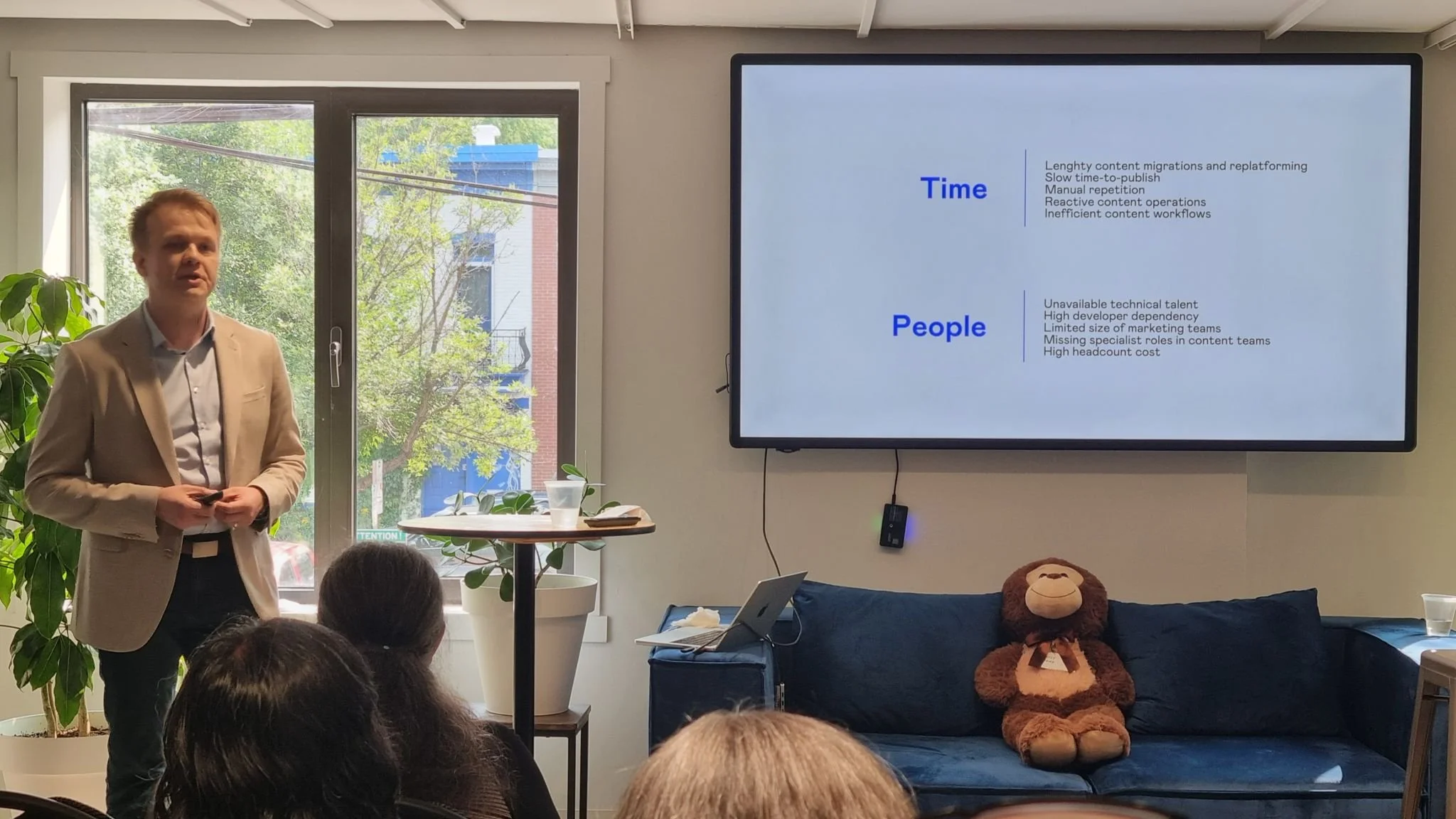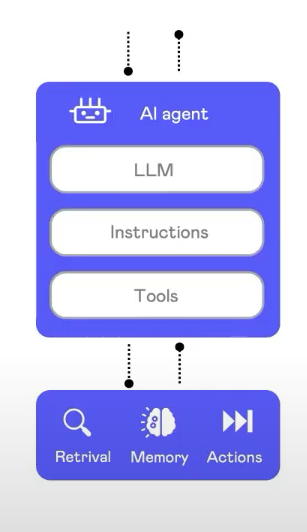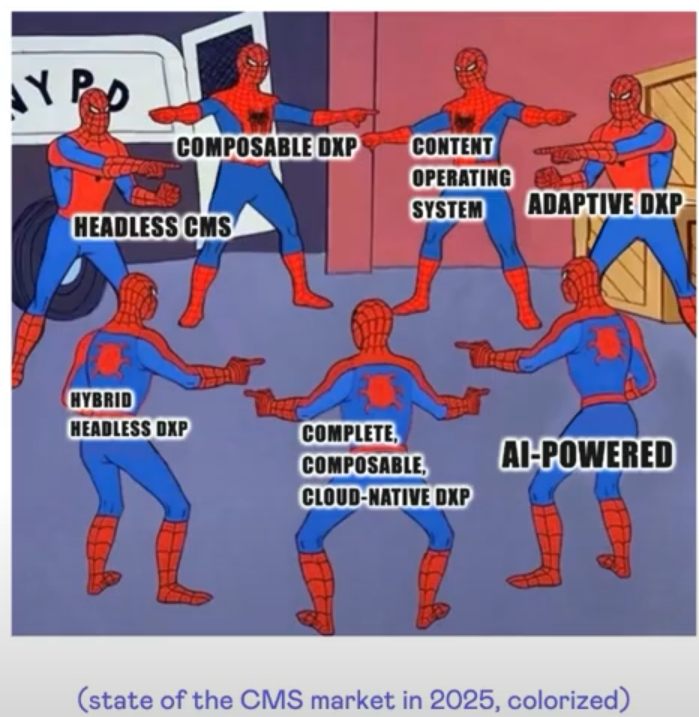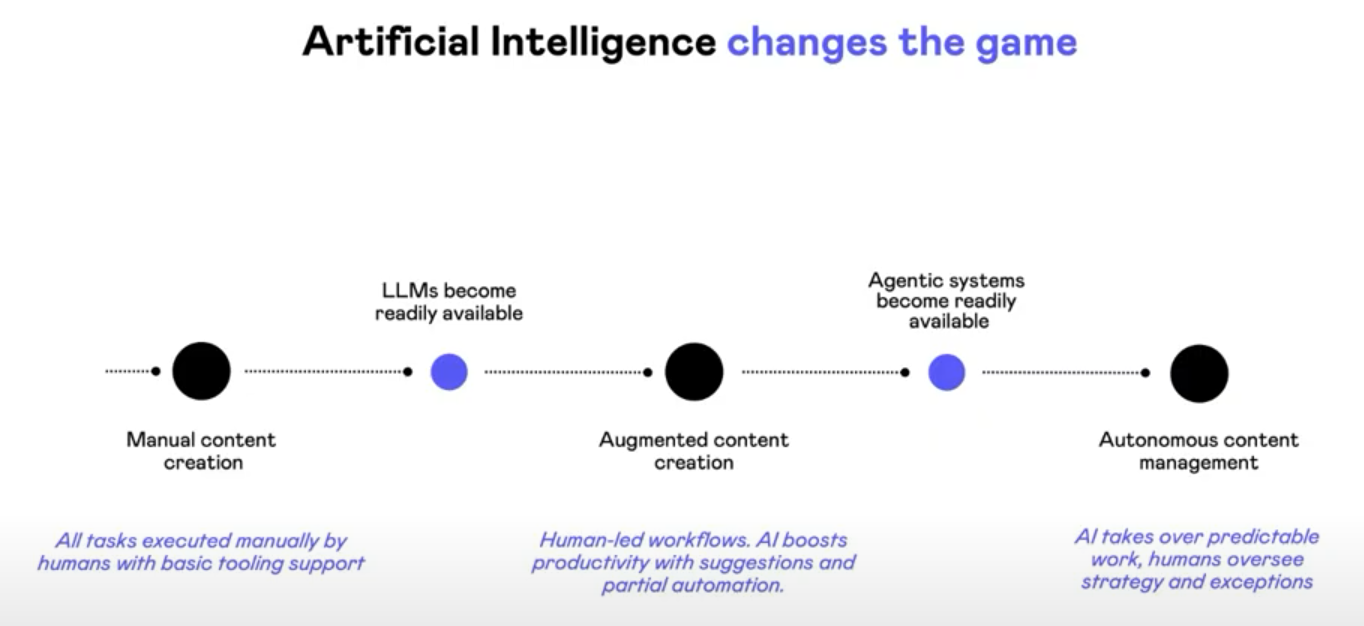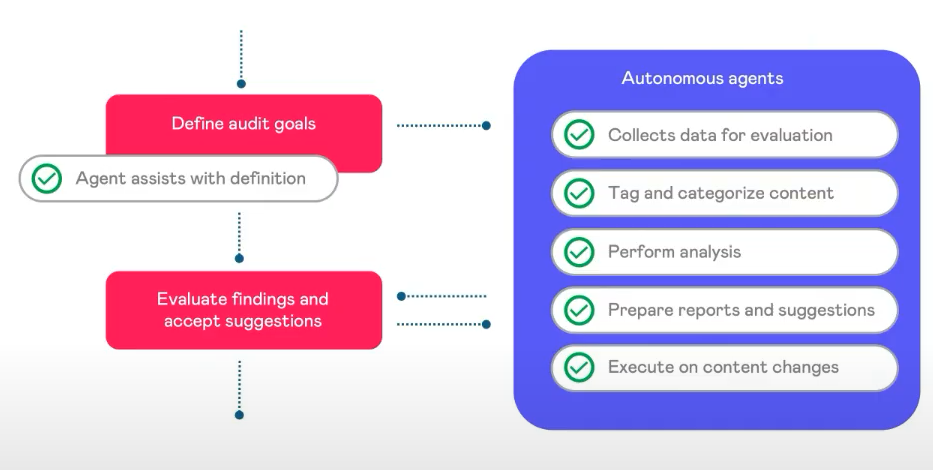By Janus Boye
Photo from the CMS Connect 25 conference in Montreal where Martin Michalik gave a brief presentation on The Rise of Agentic CMS: How AI Agents Are Redefining Content Management
AI agents are transforming how organisations create, manage, and deliver content.
In a recent members call, VP of Product Martin Michalik from CMS vendor Kontent.ai explored the concept of the Agentic CMS and shared how it represents a big shift. It’s not just faster, but fundamentally different.
In the call, he also shared examples of agent-driven workflows, and went deeper into how this shift is different from traditional automation, and finally how to prepare your content strategy for an agent-powered future.
As he said in a quote that resonated with the group:
“In a world saturated with noise, the winning strategy is not to create more content. It’s better content that wins. Finally, we have the tools to make it.”
Let us start at the beginning. By now, you have probably heard of AI agents, but what is agentic CMS?
What is an agentic content management system?
2025 is the year of agents. Read much more in this post: Principles of Building AI Agents
Simply put, an agentic CMS contains autonomous AI agents who handle tasks like content generation, compliance, and governance. One simple example, more to follow later, could be that you could have an agent inside your CMS to go through all your published content and suggest changes to make the language more inclusive.
A simplified illustration of how an AI agents work based on LLM, instructions and tools
As you might know, contrary to the name, content management systems are actually rarely used to manage content. Most organisations use CMS as a content-entry tool, while the “management” part is often orchestrated using email, Excel and Word. That’s not scalable, nor efficient, and agentic CMS could potentially change this.
In the call, Martin highlighted these three important attributes of an agent:
It’s an autonomous software entity that can operate independently towards a goal without needing step-by-step instructions.
It’s context-aware and execution-ready. An agent can interpret content and workflow states, trigger workflows if you allow it, and it can go beyond suggesting changes and actually do them, if you prefer.
It’s a composable unit of specialisation. Each agent can do a specialised task, like optimise your website to better get found on ChatGPT or handle translation.
Let’s take a step back to fully understand the impact. For this, Martin offered us a timeline that led us to where we are today.
Agentic CMS in a confusing 2025 marketplace
Kontent.ai won the Small Feature Award 2024 showing a live demo of a copilot-styled AI assistant that makes content management better
Martin put the introduction of agentic CMS into a broader context of increasing digital demands and expectations in the past decades.
On a timeline, he started at the turn of the millennium with Web-centric CMS that enabled marketers to create content and publish content via page-based templates. This was followed by the era of digital experience platforms (circa 2010), which introduced suites that could unify content, analytics, and customer experience.
The marketplace for CMS in 2025 is a confusing one. Illustration by Martin Michalik
Then in circa 2015, the headless CMS wave came which decoupled content from presentation, allowing better content reuse and multi-channel publishing.
Around 2020 we saw the beginning of the composable era going from suites to tech stacks. Similar to in the headless CMS era, the pendulum swung towards the developers, which could now more easily compose their own stack from specialised API-first tools.
Finally, now we have had a few years of AI everything, and we are seeing the big impact GenAI is having, also on the content management systems. Sounds confusing? Yes, indeed, and Martin offered the illustration of many different Spiderman pointing at each other.
Or as Martin said:
“The good news is that technology keeps improving. Also the demand on content keeps going up. The bad news is that so far team capacity has gone down. Agentic CMS aims to change this.”
AI agents changes the game, also for CMS as we know it
As an analyst, I have seen my fair share of ‘AI in CMS’ demos. Others have also argued that the beginning of the AI and LLM craze was mostly about nifty demos, like “make this text longer” or “suggest a text for this headline”.
Cool stuff, but the value wasn’t really there and the tremendous wave and behaviour changes brought by ChatGPT perhaps overshadowed some of the bigger picture for many.
As Martin argued, agentic CMS takes the power of AI inside a CMS to the next level. In an agentic CMS, AI can help automate content audits, governance and much more. This is useful for large-scale content operations in particular.
Martin shared this timeline, which shows the impact AI is having on CMS. From impacting manual content creating, augmenting it and now making autonomous content management possible
Content audits, compliance checks, and governance have been tedious tasks that many organisations have been truly troubled by in the past decades. Agentic CMS can put this on wheels, so to speak, and allow your editorial team to focus on the human touch, e.g. creativity and content performance optimisation.
Let’s look at how content audits could be done better
To illustrate the big impact of agentic CMS, Martin showed us a classic case of content audits. A content audit with the usual tasks, e.g. creating a content inventory, evaluating content and taking appropriate action would usually take multiple people several weeks, perhaps even months.
Just the step of defining the audit goals, evaluating findings and doing improvements is usually a tedious and time consuming process.
In an agentic CMS, and as shared in the illustration, the agent can assist with defining the audit goals and then also do a bunch of tasks automatically, including:
Collecting the data for evaluation
Tag and categorising as appropriate
Perform analysis
Prepare report and suggestions
Execute on content changes
With help from the agents, this would all take a single person a short time, with results happening within minutes and at quite low cost.
Martin also shared screenshots of how this is already possible today in Kontent.ai and how they have built the prompting and dialog into the interface. Quite impressive and also popular with industry analysts. This is also the demo that won Kontent.ai the Small Feature Award 2004 and CMS Idol 2025 in Florida in January. For more on these wins, see:
Looking ahead and getting the benefits of agents
While still early days, agentic CMS is already proving its value. If you consider the content lifecycle, most content teams today focus on planning, creating and publishing content. In the future, this could shift to more time on the much needed strategising, ideating, measuring and optimising.
Besides a focus shift, agentic advancements enable us to complete content chores at much faster than in the past. To quote Martin:
“This efficiency gain returns valuable time to content teams, allowing them to focus on what truly matters—creating better content.”
From an analyst perspective, the usual advice applies: Start small, reap the benefits, learn and then repeat words scaling. It’s always tricky to compare this trend to other trends, but what is really interesting here unlike the past decade of more technical focus, is that this firmly shifts the pendulum back towards a focus on content and the stories you want to tell.
Learn more about AI agents and agentic CMS
The conversation naturally continues in our peer groups at conferences in Europe and North America. Why not join us and be a part of it?
You can also download the slides (as PDF) or even lean back and view the recording from the call

